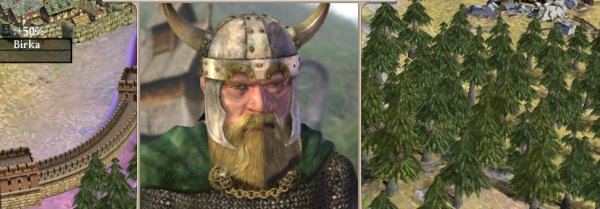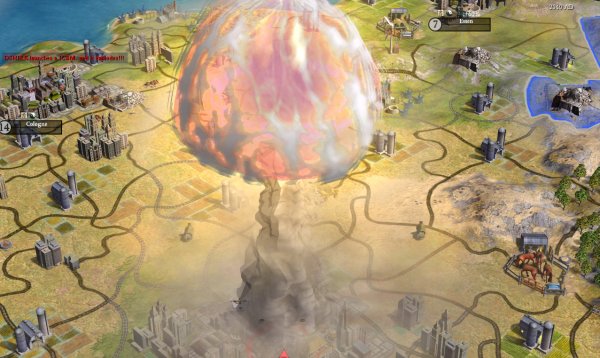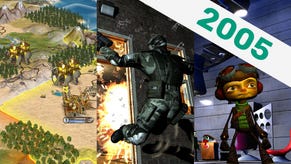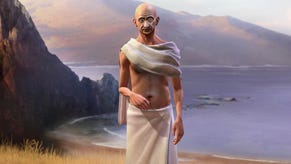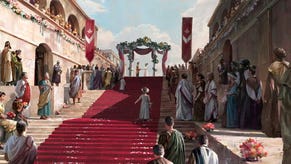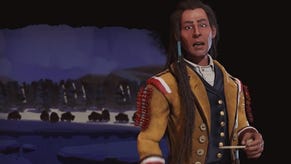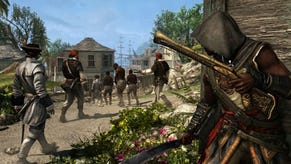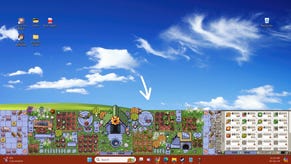Making Of: Soren Johnson On Civ 4
The Interview I did with designer Soren "Ex-Civ, Now Spore" Johnson in December could be roughly divided into two parts. The bits which were not about Civ 4 and not about Spore. We published these in January, where we talked about the future of the PC being Punk Rock. The second half were the bits about Civ 4, which we publish below, where Soren talks extensively about Firaxis' desires for the project, why Civ multiplayer had never worked in the past, and the difficulties of moving the old warhorse into 3D.
The non-existent part where we talked about Spore will never be published, as it didn't happen. Pay attention.
RPS: Could you talk about Civ 4's genesis?
Soren: The time kind of came. The last expansion pack for Civ 3 was Conquests, which was done out of house. We were kind of helping out a bit with it, but we weren't working on our own expansion pack for Civ3. The topic came up: “It may be time to work on Civ 4”. I'd been prototyping some other stuff for a while to see if I could get certain things working, but I always knew that Civ 3 was... well, it was a cool and crazy project which blew up half way through. It was a cool game which was great to work on – and my first major project, basically – but we could make a huge list of all these things we'd want to do better if we could do it a second time around.
The schedule lined up and it was clear to me that there was a huge potential for Civ 4, and I wanted to start on it as soon as possible so we could have a full two and a half years of development on it. With Civ 3, the full team working on it only had a year and a half. I really wanted to increase the schedule. Once it started to come around, it was, like, “It's time to get stuff together.” Most of the company were working on Pirates at the time, but we were able to get a decent number of programmers early, which was hugely important to its success. We sat down right at the beginning – Sid, Jeff and I, and other people who were interested in the project, and asked – What does Civ 4 mean? Why are we making it? What are the high-level goals here? We listed four things, in order, which we wanted to hit on. The four things we wanted to succeed with.
RPS: Which were?
Soren: The first one was accessibility. I felt that Civ had kind of existed in its own interface world for a long time, and its own gaming conventions. A lot of strategy games share. You don't want people to have to relearn the interface every time they play the game. It's important to remain aware of what the competition are doing. I didn't feel that Civ had done a very good job of that. Basic things like left click select and right click move which we'd never really adopted, I wanted to bring forward for Civ 4. Beyond that, there were a lot of gameplay mechanics that it was clear to me weren't adding any fun to the game and were definitely tripping newcomers, making the game more difficult to get into. Obviously these are things like corruption and pollution, but there are even trickier things like previous Civ games...
Like every time you build a settler or worker, it takes population away from your cities. Which lead to a weird condition where if you finish producing all the shields you need to produce your settler, but the city wasn't the right size, your city sort of... stuck. Nothing would happen until it grew big enough, and that could sometimes be an infinite loop. That's just not a good thing to leave around for players. Or even the way city riots worked! That's a classic example, I think, of how you can change the city riot rules so the gameplay mechanic is the exact same and the strategy is all there, but it's way less frustrating for the player. In the previous Civ games, if the turn ended and you had more unhappy people than happy people, your city went into revolt. This meant that at the beginning of the turn there would be four or five pop-ups you'd have to jump through because various cities around your country had erupted into a riot because you didn't get the balance right. This meant for serious Civ players, at the end of every one of their turns they'd have to go into each of their cities and scroll through them all to make sure their happy and unhappy were balanced right, because if they didn't the cities would go into riots, lose a turn of production, you might lose a building... in strategy games, you're going to follow the path to success. If the game's encouraging you to do that, you're going to do that.
In Civ 4, we said... okay, how about this. If you don't have enough happiness to balance out unhappy people, these people just stop working. They turn into what we call lazy people. So if you don't have enough happiness in Civ 4, you'll go into your cities and you'll see a couple of guys off to the side who are on strike... but the city isn't rioting, you're not going to lose buildings, there's no pop-ups to deal with... it's just a slow drag on your economy. Expert players are going to want to optimise this, and go in to make sure the city has good balance. We put a little icon on every city bar which has this unbalance, so you don't even need to go into it. But a new player doesn't have to deal with all these pop-ups and they'll figure out the system whenever it's time for them to figure out the system. That's the key point. When you go into a game like Civilization, there's a lot of rules and it's impossible for someone to enjoy the game if they need to figure out all the rules in the beginning. They should feel free to just start the game and start doing stuff which makes sense to them. Build a worker or build a library? Just go ahead. At the lower difficulty levels you can kind of build whatever civilization you want to. Be a warmonger? Go ahead and do that. Build a load of culture? Go do that. The game isn't going to punish you for not playing optimally. That's only going to come in when you start pushing up the difficulty levels.
RPS: Which worked well. It's always my advice when someone asks me how to start playing Civ 4. Well, just start playing Civ 4. You'll work it out. What were the other three priorities on the list?
Soren: The second one was "3D". We wanted it to be in 3D, with a living, breathing world – the term we always used internally. We wanted to see what we could do with 3D. Which was an interesting experience. It had its upsides and downsides. There's no doubt about it. It allowed us to have a lot more variety in the world than before, and opened up possibilities for things which would become very work intensive if you tried to do them in 2D. For example, in Beyond the Sword, there are ethnic units in the game, something we had hoped to do for a long time. I believe most of those ethnic units actually got created by some of our fans, who were part of one of our internal beta groups. The game's in 3D, so if you want to make an ethnic unit, you don't need to start the whole thing from scratch – you just modify some skins. It's significant work, but it's something that maybe flows a little easier in 3D, as the animations stay the same. That stuff is cool. It's cool to have real sheep going around little the pastures, making rivers flow the right way, having roads intertwine through the forests – all that stuff is pretty cool to see.
But I don't think I thought as hard as I should have about the implications of making a strategy game in 3D where the worlds are going to be as big as they are in Civ. Because one of the first things a lot of people do when playing Civ is, "Well, I want to play a game. What's the most number of Civs I can have? What's the largest map I can have?" and beyond that "Okay... it's 200 by 100. Is this in an XML file? Great. Now I'm going to have a map that's 500 by 1000." People want to play these giant maps in Civ, and it's a real challenge to make that scaleable in 3D. To make a 3D game, you have to maintain a certain amount of data for everything that's in the world somewhere, even if it's not on the screen. You can make lots of optimisations, but you're still keeping track of a lot of entities in the world, somewhere. It's not as if there's different levels – everything has to be around somewhere. Whereas in a 2D game, it can – in a sense – be as big as you want. You're only showing X number of tiles on the screen, and you're just swapping out the graphics for them. So when the game came out we had some major performance issues for that reason. And it's tough. We needed some sort of streaming solution, but that's very unusual for a strategy game where the player expects to be able to jump to any location on the map at any time in one frame. 3D is a big challenge, and it's really important to think through what you're trying to do with 3D and if it's really possible to keep that much stuff in memory at a time.
A lot of people said they liked seeing the game in 3D – being able to zoom right in real close, to zoom out, to see the world spin around. It was a good thing for the project, but... sometimes I wonder what it would've be like if we had just stayed on the 2D train for 4. It's weird. The gameplay could be the exact same. There's no point where the graphics changed the way we would have written the game rules – it's still a board game inside your computers. With 2D, we wouldn't have had the same performance issues and we'd have been able to prototype the game perhaps even faster than we did – there's a lot of stuff we were waiting for because we were developing this 3D strategy engine as we were going along. Further, 2D strategy games are in general more accessible than 3D ones because the abstraction is more obvious when you are looking at some sort of standardized 2D tile system. We had no end of trouble get people to see where the "tile" was in our 3D world for Civ4. So, 2D vs. 3D... It's one of those things I'll never know. I mean, I'm glad we went for 3D, just for no other reason than that we were stretching what we were doing with the Civilization series. We were tackling new territory. We weren't just repeating ourselves. But everything has its trade-offs, and going 3D was no exception.
RPS: Right. The other two?
Soren: The third and the fourth ones – which are ranked in priority, so we knew if we ever hit some choice of going this way or that way, we'd know which way we'd line up. The third and the fourth ones were – multiplayer, as we'd always wanted to finally solve the multiplayer issue for Civ. There's technical hurdles there, and also design hurdles. The technical ones we solved by simply making the game multiplayer at the very beginning codewise, so that codewise – even if you're playing a single-player game – the game's still using the MP code. It's just a game with one player. We weren't ever going to write some code which we would have to go back six months later and work out how we were going to make it work in multiplayer. We just committed at the very beginning to work as a MP game, because it's trivial then to make it work as a singleplayer later. Then design wise we had to think through simultaneous movement and the team game.
RPS: So what influenced your thinking with the team game?
Soren: Age of Kings really showed me how good a strategy game could be if they took the time to balance it well. They really thought long and hard how everything stuck together. You really had multiple ways to play the game, which usually manifested itself in you being a cavalry guy or a ranged guy or a melee guy or focusing on a specific unit. Which is just cool. Also, it's really fun to play teamed multiplayer games.
Which really solved the problem for multiplayer in Civ. There had been some attempts to make Civ a multiplayer game before Civ 4, and I don't think anyone would look at them as being big successes. Usually that's because we weren't thinking very hard about the actual dynamic inside a multiplayer game of Civ. We were looking a a direct mapping of the game. If you play a game of Civ in singleplayer, it's almost a story . You're a king, and there's all these other AI civs. And we write the game rules so it's fun for you to play. The most important thing is how they relate to you. And if you get screwed, and you have a bad starting location, you're still in charge – you just have to restart the game, or quit and roll a new map, or whatever. That's what makes the game work. The player is in control.
RPS: Which clearly isn't true if there's other people to think of, yeah?
Soren: If you're in 8 player multiplayer in Civ, it's going to be a mess. Obviously, there's the turn-based issue of waiting for people to play, but most importantly the games are going to take a long time, and it's going to be fairly clear who are the people who can win and the people who are going to be also-rans. There's just no motivation to keep on playing at that point. So if you play a game of Civ in MP, one player starts doing really well and takes a lot of time with their turns, and the other guy who's doing poorly and obviously is going to lose, he's always waiting for the other guy. It's just not a really fun gameplay experience in multiplayer. When we started testing Civ 4 in MP – which is something we did right at the beginning of the project and not worrying about singleplayer until much later – it was fun and nice that we finally had the tech to make it work, and it was still kind of engaging to play Civ with a real person across the border... but there was something which always made it spiral out of control.
Finally, we learned lessons from games like Age of Kings and Starcraft and all these other RTS. It's just standard that team-play is a big focus. We started adopting that. We've got six people playing and have two sides of three and see what happened... though it took a while for us to figure out what were the right rule-sets to use. Like, they probably should share technologies, and it'll be silly for them to trade back and forth. And if they're both researching the same tech, maybe it'll go twice as fast. And then someone suggested that maybe they should share the effects of wonders... well, let's try it out and see what happens. Sounds overpowered, but on the other hand we don't want rivalries inside the teams. “He got the Pyramids! Damn, I wanted that effect.”
RPS: The complete opposite of Defcon. An ally is just who you stab last.
Soren: Which fits the shorter game. Nuclear war, after all. But we thought it was really important in Civ. Obviously, you don't have to play in teams. You can have unofficial alliances if you want. But we felt it was important in the team game to be permanent – you knew who you were with at the beginning and it wasn't going to change. Which totally changed the dynamic - it was so much fun. Firstly, people could specialise. I'll focus on wonders, because I like building, and you can focus on military. People were helping each other out; co-op is a lot of fun. If the tide starts to turn and it's clear that one side is going to win, well, you just start over. You don't have to worry about some people wanting to start over and others not. There's only two teams after all. And actually a lot of the MP I hear about in Civ 4, is like a dad and son playing against the AI at a higher difficulty level. And that's totally legitimate too. We definitely picked up those lessons from playing a lot of RTS. At Firaxis we were hard, hardcore players of Age of Kings. We figured out every nuance of that game.
RPS: And the last of the four points?
Soren: Modability. We wanted the game to be really mod friendly – I thought there was an enormous potential there. Because for some reason, the strategy genre has not been nearly as mod friendly as a lot of other games that have appeared on the PC, especially the shooter genre. Valve is built off people who went and did things with their engine. It's not in strategy game developers DNA. We really wanted to do everything to make the game moddable. My ultimate goal – in listing all my paths to get there – was keeping all our data in a standard format like XML, using Python for when we wanted to expose algorithms, and finally releasing the game and AI source code so people could change the rules to work how they wanted them to do. We got all that done and I'm really glad we did.
RPS: How pleased were you with the response to the community?
Soren: It's been great. I mean, it's always cool to hear people talk about how they liked Civ 4, they liked this part, I played some multiplayer... that's cool. That's the reason why we make games. But the coolest feeling is definitely going into the CivFanatics modding forum and to see all the cool stuff people are doing with Civ 4. Firstly, because it feels good we're empowering their creativity. If they weren't being creative with Civ 4, I'm sure there's something else they'd do, but it's neat to see they chose our format over all the other options they had for making cool and interesting stuff. And it's also interesting because, well, when you do an interview or write an article, it's not as if there's a parallel games journalist who's doing the exact same thing (well, maybe sometimes) and you finding yourself thinking, “Oh, I could have done this differently”. But when you make a game that's moddable, this is what's happening all the time. It's existing in this survival of the fittest. If someone makes a really cool mod, you're going to find out about it because people are going to be playing and talking about it. The Fall From Heaven mod is really cool and really impressive. It's got its own forum now, its own wiki – it's a big deal. A lot of the stuff modders have done, we've been able to role back into the game itself. We made the interface moddable, and there were some pretty big improvements we borrowed from the interface modders to put into the patches. Some of the best scenarios in Beyond The Sword were adopted from people inside the community. The Rise And Fall scenario is a great one, which is done by an Italian guy who Firaxis had a long term relationship with – we knew he made great mods, so showed him the game earlier and let him do some really cool stuff.
Soren Johnson is currently working on Spore. His website is here.



